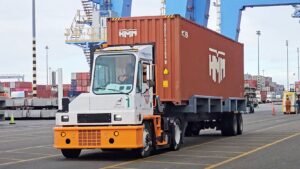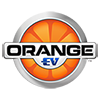The Kansas-based terminal truck manufacturer expects strong demand for electric yard tractors following the funding from the US Environmental Protection Agency.
As published on World Cargo News.

“With EPA contracts being finalised now, we are expecting orders using the Clean Ports funding to start to ramp up as early as Q1 2025,” Bill Hamlin, Orange EV Executive Director of Port and Rail, said in an interview with WorldCargo News.
“In the meantime, orders and RFP (Request for Proposal) activity have been accelerating significantly over the past couple of months with over two dozen successful multi-week demonstrations completed at ports from US coast to coast.”
Longer lead times
Hamlin said that Orange EV has delivered trucks previously within about 90 days from an order. Nevertheless, the company expects lead times will get longer amid the anticipated surge in demand. “We encourage ports to place their orders soon to lock in 2025 build slots,” he added.
Founded in 2012, Orange EV has carved a place in the Class 8 vehicle market by building new battery electric terminal tractors and rebuilding existing diesel machines with a new electric drive train. Since delivering its first terminal truck in 2015, the company has deployed over 1,230 units to more than 280 fleets in 38 states, along with Canada and the Caribbean, amassing over 17.1m miles and 6.4m duty hours.
As far as is known, most Orange EV tractors to date have been built on a Kalmar platform, but that arrangement appears to have ended. Orange EV did not comment directly, but its latest machines, especially the new Husk-e machine built for port and intermodal terminals, look very different to Kalmar’s US-made machines.
Hamlin noted that the Husk-e, which has a large 243 kWh battery, is suitable for the two-shift requirement of West Coast operators. At some sites on the West Coast, Orange EV HUSK-e trucks have shown the potential for up to 16 hours of run time without the need for opportunity charging.
Orange EV kicked off 2024 with the launch of a 440,000 sq ft (41,000 sq m) headquarters and production facility in Kansas City, valued at over US$37m. This gives it the capacity to produce up to 2,400 electric yard tractors per year on a single shift. The company plans to scale up 2025 production levels based on order volumes and timing.
Electric trucks are still more than twice as expensive to purchase as diesel machines. However, Orange EV maintains that the total cost of ownership is lower in the long run. According to the company, its electric trucks offer significant cost savings, with electricity costing up to 90% less than diesel, as well as increased operational efficiency through frequent opportunity charging. They are also safer and more comfortable for drivers due to their quieter operation, and regenerative braking that reduces stopping distances by up to 50%. The company further adds that its trucks average more than 98% uptime compared to 75% for comparable diesels.
Power grid limitations
The shift to zero-emission equipment at ports significantly boosts power needs, with electric truck charging and shore power systems for vessels requiring substantial energy. Many port city grids cannot handle these increased demands without significant infrastructure upgrades.
Hamlin said that power grid constraints and the speed of infrastructure decisions and installations will impact the pace of transition to electric tractors at US ports, especially for large-scale deployments. However, Orange EV claims its charging technology can enable ports to maximise the amount of battery-powered equipment they can deploy.
“The charging strategies and solutions that historically Orange EV has provided have allowed for much faster scaling of deployments of our trucks than others at warehouse and distribution centre locations, and we plan to assist ports as well with creative solutions to maximise the pace of deployments,” Hamlin said.
Moving forward, Orange EV is looking to expand its reach beyond North America and is open to discussions on global opportunities. The company says it is keen to engage with partners and stakeholders to bring its electric yard tractors to international markets.
Published: December 23, 2024/World Cargo News
